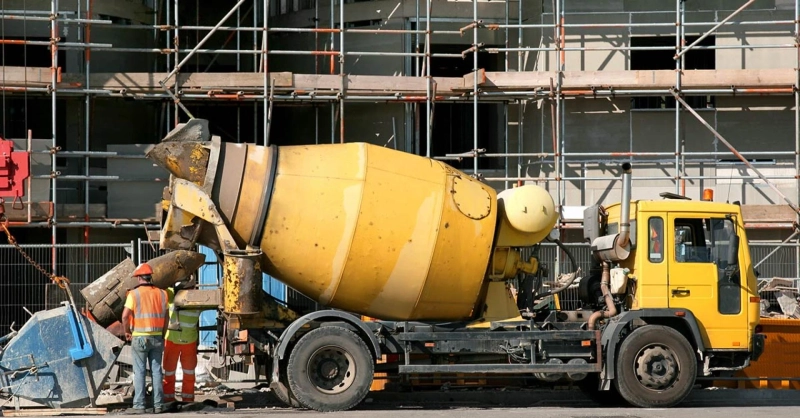In the modern world of construction, Ready-Mix Concrete (RMC) has become a game-changer. Whether it's a small home or a big commercial building, ready-mix concrete offers speed, strength, and convenience that traditional concrete mixing just can't match.
In this blog, we’ll help you understand what ready-mix concrete is, the different types available, its key benefits, and where it's used. Let’s dive in!
What Is Ready-Mix Concrete?
Ready-Mix Concrete (RMC) is a type of concrete that is manufactured in a batching plant, mixed with precise proportions of cement, aggregates, water, and additives, and delivered to the site in a ready-to-use form using special trucks called transit mixers.
Unlike site-mixed concrete, which is prepared manually at the construction site, RMC is machine-mixed under controlled conditions, ensuring consistent quality and saving time.
Types of Ready-Mix Concrete
There are several types of RMC designed to meet different construction needs. Here are the most common types:
1. Transit Mixed Concrete (Truck Mixed)
The materials are loaded into the truck at the batching plant, and the mixing is done in the truck during transit. It’s the most commonly used RMC type.
2. Shrink Mixed Concrete
Partially mixed at the plant and finished mixing in the truck. This allows better control over the quality and consistency.
3. Central Mixed Concrete (Batch Plant Mixed)
Fully mixed at the batching plant and then transported. It provides the highest quality and is suitable for complex projects.
Grades of Ready-Mix Concrete
RMC is available in different grades, which indicate the compressive strength of the concrete. Common grades include:
- M10, M15 – for pathways, non-structural work
- M20, M25 – for residential construction
- M30, M35, M40 – for commercial buildings, bridges, and heavy structures
Your engineer or contractor will suggest the right grade based on your project’s needs.
Key Benefits of Ready-Mix Concrete
Ready-mix concrete offers several advantages that make it ideal for both small and large-scale construction.
1. Consistent Quality
RMC is produced under strict control, ensuring consistent mix and strength in every batch.
2. Time-Saving
No on-site mixing is needed. The concrete arrives ready to pour, which speeds up construction.
3. Labor Cost Savings
Less manual work means fewer laborers required, which reduces costs and increases safety.
4. Reduces Material Wastage
With pre-measured materials, there's minimal wastage of cement, sand, and aggregates.
5. Cleaner Construction Site
Since mixing doesn’t happen on-site, there’s less dust, debris, and noise, making the site cleaner and safer.
6. Environment-Friendly
RMC plants are more efficient and use eco-friendly practices, reducing water usage, energy consumption, and pollution.
Common Uses of Ready-Mix Concrete
Ready-mix concrete is used in a wide range of construction projects. Here are some popular applications:
Residential Construction
- Home foundations
- Driveways and pavements
- Roof slabs and beams
Commercial Buildings
- Office complexes
- Shopping malls
- Parking lots
Infrastructure Projects
- Roads and highways
- Bridges and flyovers
- Dams and tunnels
Precast Elements
- Concrete blocks, pipes, poles, and panels are made using RMC for uniform strength.
When Should You Use Ready-Mix Concrete?
You should consider using RMC if:
- You have a tight deadline
- You need high-quality concrete
- Your site has limited space
- You want to reduce labor and material waste
- Your project involves complex or large-scale work
Ready-Mix Concrete vs Site-Mix Concrete
Here’s a quick comparison to help you decide:
FeatureReady-Mix ConcreteSite-Mix Concrete
Mixing LocationBatching plantOn-site
Quality ControlHighVariable
Time NeededLessMore
Labor RequirementLowHigh
Material WastageMinimalHigh
Cost-EffectiveIn long termOnly in very small works
Conclusion
Ready-Mix Concrete is transforming the construction industry with its quality, speed, and efficiency. Whether you’re building a home, road, or high-rise, RMC offers a smart, modern, and reliable solution.
From reducing waste to improving safety and saving time, ready-mix concrete is the go-to choice for builders who want better results with less hassle.
FAQs – Understanding Ready-Mix Concrete
1. Is ready-mix concrete suitable for small home projects?
Yes, many suppliers offer small loads of RMC for home use like driveways, slabs, and flooring.
2. How is ready-mix concrete delivered?
RMC is delivered in transit mixer trucks that keep the concrete fresh and ready to pour on arrival.
3. Can I order custom concrete grades?
Yes, batching plants can customize mix designs based on your structural and project requirements.
4. Is ready-mix concrete more expensive?
While initial costs may be slightly higher than site mix, it saves money in the long run through reduced labor, waste, and faster work.
5. How soon should ready-mix concrete be used after delivery?
RMC should be used within 90 to 120 minutes of mixing for best strength and workability.


